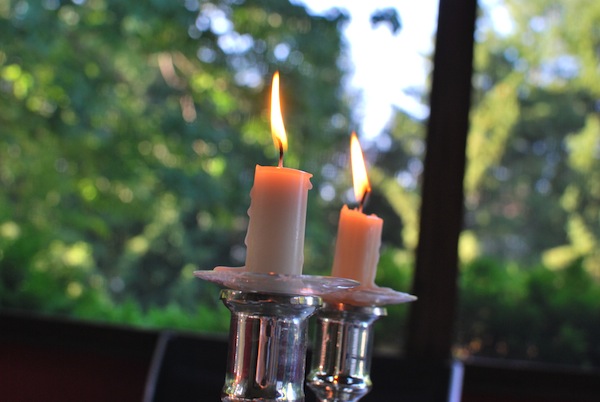We have two Jewish dogs. When we sing Shabbat blessings, our dogs come over, sit politely, and wait until we’re done with the Hamotzi, the blessing over the bread. Then, they each get a small chunk of challah. This is the only people food they get. We don’t feed them while we eat and they don’t beg. However, when they hear us start to sing blessings, they know what to do!
On Chanukah or Passover, we are ready with alternative treats. Every night after we light Chanukah candles, they get dog biscuits. On Passover, they get matzah.
Our lab/pointer mix, Sally, who is more than 15 years old, has been doing poorly. Bigger dogs don’t usually live this long. She’s had a good life. We love her dearly. When she started having trouble eating, despite pandemic vet visits and several medicines, we were ready to try anything. She vomited and would eat only sparingly.
Then I had an idea. We had leftover homemade challah after Shabbat ended last week. I took out a piece, broke it into smaller bits, and started reciting brachot (blessings). I sang the Hamotzi. She moved her sore joints and sat near me. She ate challah. I did it again. She ate a little more challah. I kept going. In my happy blessing voice, I sang the Shehecheyanu (“Who has given us life”) blessing, feeling grateful for having reached this moment. Challah eaten. I thanked the Almighty for making me in the divine image. Challah eaten. I sang the blessing about giving tired people the strength to go on, from the morning blessings. She ate more challah.
My husband had small luck with this approach. In the end, she ate more for me. Was it my singing? My happy fake-out training technique, after 15 years of dog training to sit for blessings? We don’t know why it worked. After a day or two, we ran out of challah and switched to dog biscuits. Now, she is eating a weird mixture of special canned dog food diet, chicken and kibble again. Things are better, for now.
I want to tell one of our relatives, Ann, in New York City, about this success – about our old Jewish dog, her many blessings and the challah – but I can’t call her. She died May 3rd from a blood disorder. Once she was admitted to the hospital in New York, she was alone. Although she didn’t die from COVID-19, she died alone because of it. Ann, may her memory be a blessing, loved dogs and Jewish tradition. She would have laughed to hear about how Sally regained her appetite because of those blessings and challah.
It feels right now like we’re wandering in the wilderness. There’s so much uncertainty surrounding the COVID-19 pandemic. Every day, things change. Many news sources refer to this virus as “the novel coronavirus.” Yes, it’s new, unlike all the other coronaviruses. Yet, in some ways, this situation, where we’re faced by terrible illness or challenge, arises repeatedly throughout the Torah, rabbinic texts and our history. It may be new to us, but it’s the same old story. How do we face these challenges? How can we behave in Jewish ways when the challenges seem so huge? We study what worked in the past – our history and traditions can help.
How do we make Shabbat (or make anything special) in a time when all the days seem hard and the same? In the Talmud, Tractate Shabbat 69, “Rav Huna said: ‘If someone was walking on the road or in the desert and he does not know when Shabbat is, he counts six days and then keeps Shabbat for one day.’ Hiya the son of Rav said: ‘He keeps one day and counts six.’ What is this dispute really about? One bases his opinion on the creation of the world, and one bases his opinion on Adam.”
The rabbis discuss whether we celebrate Shabbat after the six days of creation so, when we don’t know which day is Shabbat, we count six days and then observe one. But Rav Hiya starts with Adam, the first person, and recognizes that one starts with our creation story. Without humans, there would be no way to make Shabbat, so we celebrate first, and then we count six until the next Shabbat.
Rav Hiya’s approach reminds us that we humans are central to this Jewish observance narrative. Our family had to remember that, even if burials and shivah aren’t done normally now, Zoom memorial services and shivahs are for us, the living, to help us navigate through this uncertainty.
Sally the dog is still with us for now, thank goodness. She reminds me, every day, to keep counting (and reciting!) my blessings. Whether you count six days and then celebrate, or celebrate and then count six days, we have these very human routines to help in navigating the unknown – the road, the desert, or a global pandemic.
So, please, grab some challah, say a brachah and train your Jewish dog. Somehow, I can still hear Ann (z”l) laughing as I tell this story. Ahad Ha’am said, “More than the Jewish people have kept Shabbat, Shabbat has kept the Jews.” Our dog Sally has reminded us, too, that, once we say those blessings, a delicious treat always follows. It’s up to us to keep making the blessings and finding those Shabbat treats.
Joanne Seiff has written regularly for CBC Manitoba and various Jewish publications. She is the author of three books, including From the Outside In: Jewish Post Columns 2015-2016, a collection of essays available for digital download or as a paperback from Amazon. Check her out on Instagram @yrnspinner or at joanneseiff.blogspot.com.

